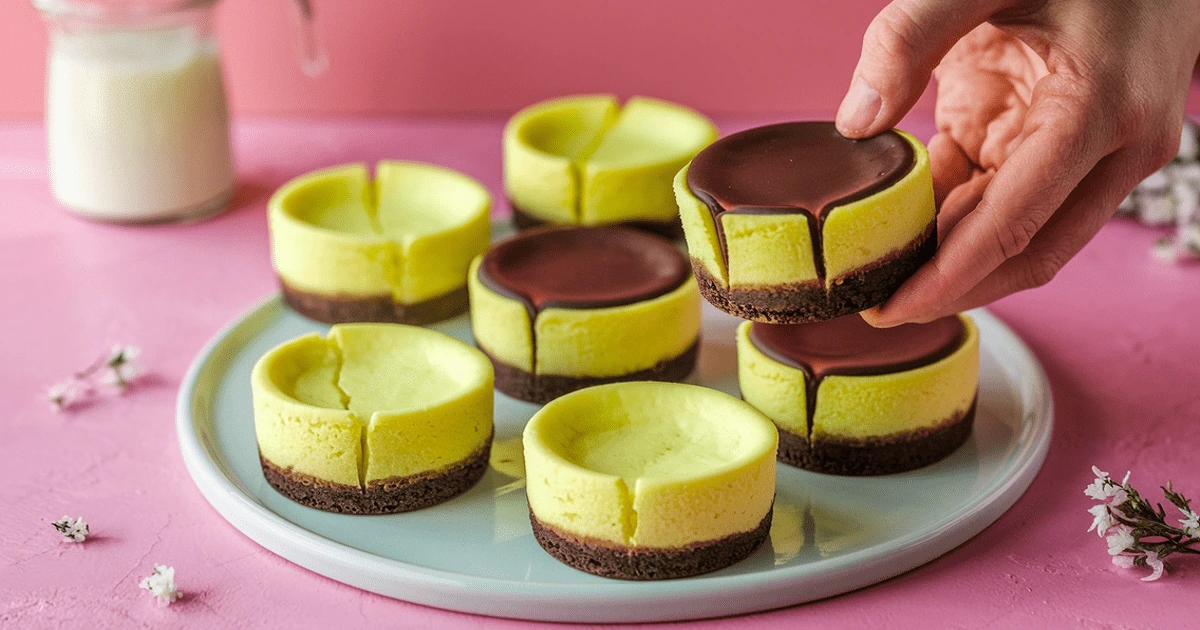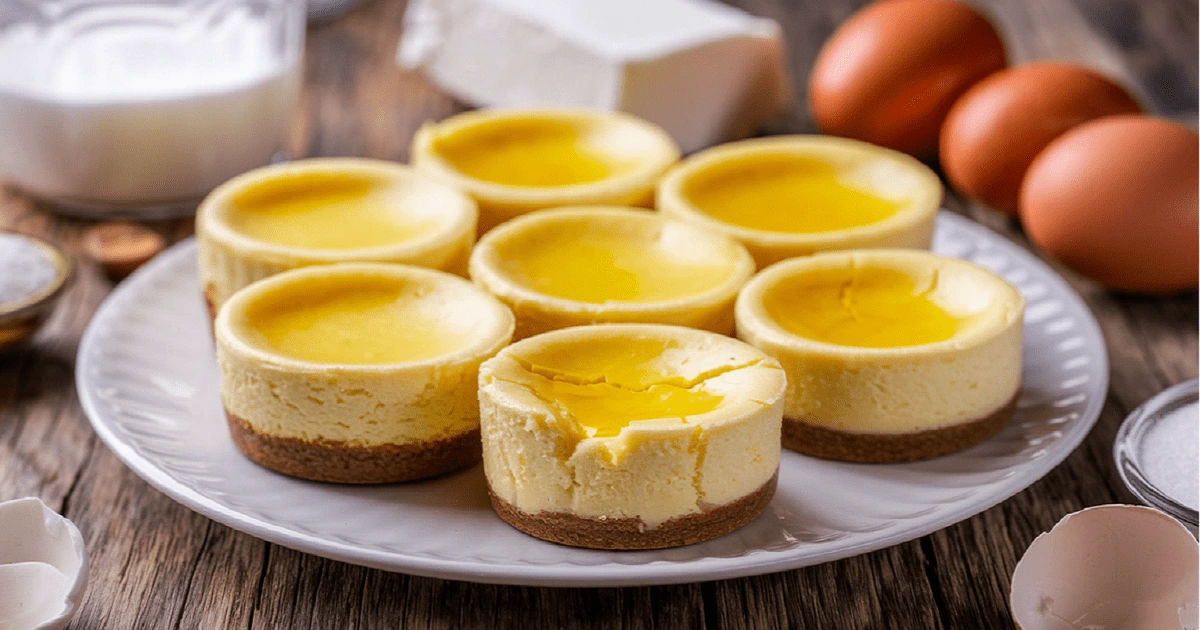If you’ve ever baked mini cheesecakes, you know the frustration of pulling them out of the oven only to discover unsightly cracks marring their smooth tops. Why did my mini cheesecakes crack? This is a common question many home bakers ask when faced with this issue. These cracks can be caused by a variety of factors, such as overbaking, rapid cooling, and air bubbles in the batter. While cracks don’t ruin the taste of the cheesecake, they certainly affect the presentation, leaving bakers searching for solutions to prevent and fix cracked cheesecakes. Understanding the reasons behind mini cheesecake cracks and knowing how to avoid them can ensure a perfect dessert every time. In this comprehensive guide, we’ll explore the common causes of cracks, how to prevent them, and effective ways to fix mini cheesecakes that have cracked.
Cracks in mini cheesecakes are usually caused by several factors such as overbaking, rapid cooling, excessive air in the batter, and improper mixing techniques. Each of these issues creates stress on the cheesecake as it bakes and cools, leading to the cracks that form on the surface. Fortunately, by mastering a few simple techniques like controlling oven temperature, using a water bath, and ensuring proper cooling methods, you can avoid these common mistakes. Not only will your mini cheesecakes look smooth and flawless, but they will also retain their creamy, rich texture.
In this guide, we’ll explore all the potential reasons why your mini cheesecakes crack, step-by-step instructions on how to prevent this from happening, and what to do if you encounter cracks. Whether you’re making these cheesecakes for a special occasion or simply enjoying them as a treat, this guide will ensure that your mini cheesecakes turn out picture-perfect every time.
Causes of Why My Mini Cheesecakes Crack
Cracks in mini cheesecakes are caused by a few common baking mistakes. These include overbaking, rapid cooling, air bubbles, and improper mixing. Let’s analyze each of these causes in detail:
1. Overbaking Your Mini Cheesecakes
Overbaking is one of the most common causes of cracks in mini cheesecakes. When mini cheesecakes bake for too long or at too high a temperature, the moisture in the batter evaporates too quickly. This leads to the surface of the cheesecake drying out and cracking as it contracts.
To prevent overbaking:
- Bake your mini cheesecakes at a low, consistent temperature (usually around 325°F or 160°C).
- Avoid opening the oven door frequently, as this causes sudden drops in temperature, further exacerbating the problem.
- Check for doneness by giving the cheesecakes a slight jiggle. The center should still have a slight wobble, which will firm up as it cools.
For a more detailed look at baking tips, visit this baking guide on preventing cracks in cheesecakes.
2. Rapid Cooling
Another major culprit behind cracked mini cheesecakes is rapid cooling. When mini cheesecakes are exposed to a sudden temperature drop after being taken out of the oven, they tend to contract too quickly, which leads to cracks. Cheesecakes, especially mini ones, are delicate and need time to gradually settle.

To cool mini cheesecakes properly:
- After baking, switch off the oven, slightly open the oven door, and let the cheesecakes cool down slowly for 30 minutes.
- Afterward, move them to a wire rack to finish cooling at room temperature before refrigerating them.
- Never place freshly baked mini cheesecakes directly into the refrigerator as this sudden cooling can cause the surface to crack.
3. Air Bubbles in the Batter
Over-mixing the cheesecake batter can introduce air bubbles, which expand during baking and lead to cracks. When the batter is mixed too vigorously, air gets trapped inside, and as the batter bakes and rises, these air pockets can create small fissures on the surface of the cheesecakes.
To prevent air bubbles:
- Use room-temperature ingredients. Cold ingredients don’t blend as well and require more mixing, which introduces more air into the batter.
- Mix your batter on low speed and avoid over-mixing. The goal is to combine the ingredients until they are just incorporated.
- After pouring the batter into the molds, gently tap the pans on the counter to release any trapped air bubbles before baking.
By following these steps, you can ensure a smooth texture for your mini cheesecakes without any cracks.
How to Prevent Mini Cheesecake Cracks
Comprehending the causes is the initial step towards prevention. Now, let’s explore some key techniques to keep your mini cheesecakes looking flawless.
1.Using a Water Bath to Stop Mini Cheesecakes from Cracking
A water bath, often referred to as a bain-marie, is an extremely effective technique for preventing cracks. The water bath creates a moist, even-heat environment that allows the cheesecakes to bake gently and prevents the surface from drying out.
How to set up a water bath:
- Place your mini cheesecake molds in a larger baking pan.
- Fill the larger pan with hot water, making sure the water reaches halfway up the sides of the molds.
- Bake as usual, and the steam will help keep the cheesecakes moist and smooth.
If you need more information on how to set up a water bath effectively, check out this baking resource from Taste of Home.
2. Control Oven Temperature
A consistent oven temperature is key to perfect mini cheesecakes. Fluctuations in temperature can cause uneven baking, leading to cracks.
Steps to maintain an even temperature:
- Preheat your oven and allow it to stabilize at the recommended temperature (usually 325°F).
- Avoid opening the oven door frequently during baking, as this will cause temperature drops.
- Invest in an oven thermometer to ensure that your oven’s temperature is accurate.
Maintaining the right temperature will prevent overheating the cheesecake surface while the interior is still baking, ensuring even results.

3. Avoid Over-Mixing the Batter
As we discussed earlier, over-mixing introduces air into the batter, which leads to cracks. For best results:
- Mix the ingredients gently and on a low setting.
- Make sure all the ingredients, such as cream cheese, eggs, and sour cream, are at room temperature before mixing. This makes blending easier and avoids overworking the batter.
- Stop mixing once the ingredients are fully incorporated, and don’t over-beat them.
By paying attention to how you mix the ingredients, you’ll greatly reduce the chance of cracks forming.
4. Gradual Cooling
Cooling your mini cheesecakes too quickly is one of the main reasons for cracks. After baking, follow these steps to cool them gradually:
- Switch off the oven and let the cheesecakes remain inside with the door ajar for approximately 30 minutes.
- Take the cheesecakes out of the oven and set them on a cooling rack to come to room temperature for one hour before putting them in the refrigerator.
How to Fix Cracked Mini Cheesecakes
Despite your best efforts, cracks might still happen. Fortunately, there are several ways to fix or disguise these cracks, making your mini cheesecakes look as perfect as they taste.
1. Add a Topping
One of the simplest ways to fix cracked cheesecakes is by adding a delicious topping. Popular choices include:
- Fresh fruits, like berries, add both color and texture.
- A drizzle of chocolate or caramel sauce to cover cracks while enhancing flavor.
- Whipped cream or cream cheese frosting to create a smooth, decorative surface.
This method works well if you want to present your mini cheesecakes in a beautiful and appealing way.
2. Smooth the Crack
For minor cracks, you can smooth them out using a clean, damp spatula. Gently press and blend the surface back together while the cheesecake is still warm. This technique works best if you catch the crack early before it sets completely.
Frequently Asked Questions (FAQs)

How do you keep mini cheesecakes from cracking?
To prevent cracking in mini cheesecakes:
- Employ a water bath to ensure even distribution of heat.
- Avoid over-mixing and overbaking.
- Cool the cheesecakes gradually after baking.
These techniques will help maintain a smooth, crack-free surface.
What causes a cheesecake to crack?
Cheesecakes can crack due to overbaking, air bubbles, rapid cooling, and improper mixing. Each of these factors can stress the cheesecake’s structure, causing it to crack as it sets.
Is a cheesecake ruined if it cracks?
No, a cracked cheesecake is still perfectly edible and delicious. The crack is solely aesthetic and has no impact on the flavor. You can use toppings to cover the cracks if needed.
How do you fix a cracked cheesecake?
A cracked cheesecake can be repaired by gently smoothing the surface with a spatula, or by concealing the cracks with toppings like fruit, whipped cream, or chocolate sauce.
Conclusion
Baking mini cheesecakes can be a rewarding experience, but cracks on the surface can leave you feeling frustrated. Thankfully, with the right knowledge and techniques, you can easily prevent or fix these cracks. The primary causes of cracks, such as overbaking, rapid cooling, and over-mixing, can be avoided by following the strategies outlined in this guide. Using a water bath, controlling the oven temperature, and cooling cheesecakes gradually are key steps to achieving smooth, crack-free mini cheesecakes. Even if cracks do appear, don’t worry simple toppings or smoothing techniques can make them look perfect again.
By paying attention to the details in your baking process, you’ll ensure that your mini cheesecakes are as beautiful as they are delicious. With practice, you’ll master the art of baking flawless mini cheesecakes every time.
For more helpful tips and recipes, don’t forget to explore the cheesecake recipes on Kinsley Recipes, where you’ll find additional inspiration to refine your baking skills. Happy baking!

